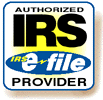
|
Income Tax Service |

|
December 07, 2009

Income Tax Service

December 07, 2009
The decision on when to itemize is simple. Generally, you do it if the total of your itemized deductions is greater than your standard deduction.
However, some taxpayers must itemize , even if their deductions are less than the standard deduction. You must itemize your deductions if:
Your tax is based on your taxable income . That's your total income after you've subtracted above-the-line deductions like your Individual Retirement Account or other qualified retirement-plan contributions, moving expenses or alimony payments, plus your personal exemption and either:
Your itemized deductions are referred to as below the line deductions. (Your "adjusted gross income" is "the line".) Clearly, the more you can deduct, the less in tax you have to pay.
| The standard deductions that apply to your 2009 and 2010 taxes | |||||||||||||||||||||||||
|---|---|---|---|---|---|---|---|---|---|---|---|---|---|---|---|---|---|---|---|---|---|---|---|---|---|
|
|
||||||||||||||||||||||||
If you take the standard deduction, and pay property taxes on a principal residence, up to $500 ($1,000 on a joint return) can be added to your normal standard deduction amount. Congress claimed to pass this provision to stimulate the housing market. In fact, it mostly benefits those who have paid off their mortgages (and lost the interest deduction) but are still paying property taxes.
There are seven categories of itemized expenses that you can deduct on your taxes:
The key, then, is to maximize the value of your itemized deductions . However, the strategies for maximizing your itemized deductions can be complex. Here's where planning can put dollars in your pocket.
Medical expenses are deductible only after they exceed a exclusion. No medical expenses are allowed as itemized deductions except for the amount that exceeds 7.5% of your adjusted gross income. That means if you have an adjusted gross income of $100,000, the first $7,500 of your medical expenses doesn't count.
But sometimes, elective medical expenses can be accelerated or even deferred. For example, orthodontia payments for you or your dependents can often be extended. They always can be accelerated. These expenses are deducted in the year they are paid, not necessarily in the year the service is rendered.If you can already can pass the 7.5% test for allowable expenses, or these expenses would put you over the minimum hurdle, then consider accelerating them. If you lack the cash, consider charging the expenses. On credit card charges, you are allowed the deduction in the year of the charge, not in the year that the charge is paid off.
Don't automatically accelerate if it puts you over the 7.5% floor. Remember, your total itemized deductions must exceed your standard deduction before you get any real additional benefit from any of them. Allowable medical expenses are just one component of the package.
If you don't exceed the 7.5% floor or your total itemized deductions don't exceed your standard deduction this year, you should consider deferring your payments or any elective medical procedures. You get the use of the money -- and any investment returns. In any case, you may be able to use the deductions in the subsequent year when you revisit the itemizing vs. standard deduction question.
Miscellaneous itemized expenses are also deductible only after they exceed a exclusion. In this case, it's 2% of your adjusted gross income. So, with an adjusted gross income of $100,000, your first $2,000 of miscellaneous itemized deductions won't count.
But here again, these deductions can be either accelerated or deferred. Miscellaneous itemized deductions such as those mentioned above can be paid in the year of your choice. Many of my clients send my tax-preparation fees to me on December 31 in order to get the deduction in the year the check was mailed. I don't get the income until I receive the check -- in the new year.The rule here is the same as with medical expenses. First, qualify the expenses to be included in the deductible pot. Then, only if you expect to itemize, accelerate. If not, defer.
Let's look at the mortgage interest you are paying.
Your January payment on your mortgage includes the interest you accrued for December of the previous year. By making your January 2010 payment on Dec. 31, 2009, you have accelerated a full month's interest deduction into 2009. In the 25% bracket for 2009 on a $1,000 interest payment, that saves you an immediate $250. By doing that each year, you have created an interest-free loan of that $250 in perpetuity or at least until the loan is paid off.Unfortunately, you can't prepay two or three months in advance because the interest deduction must relate to the year the money was used. But your December 31, 2009, payment will be for the use of the money during December 2009.
You can accelerate some tax payments as well. If you don't pay your real-estate tax in your mortgage, you have the opportunity to accelerate your real-estate tax payments.
While my real-estate taxes aren't due until January 31 of the following year, I always make my payment on Dec. 31 of the current year.The technique is the same with estimated state income tax payments . I make my estimated state income tax payment, due on January 15th, by December 31st.
Any voluntary expenditure can be accelerated or deferred. Your gifts to charity are the best example.
Whether your $1,000 contibution to your church, synagogue, or other charity is sent on Dec. 31, 2009, or Jan. 1, 2010 (or Dec. 31, 2010, or Jan. 1, 2011), makes little difference to the charity receiving the money. However, in the 25% bracket for 2009, it can make a $250 difference to your tax bill -- but again, only if your total itemized deductions exceed your standard deduction.Don't overlook the charitable deduction for the donation of non-cash items such as; furniture, appliance, clothing or household items to Goodwill or the Salvation Army . Be sure to make a list of those items and their fair market value at the time of the donation and get a receipt by December 31st.
If I can qualify for claiming the itemized deduction my taxes, I want to accelerate my itemized deductions. A dollar (of taxes) not paid today is worth a lot more than a dollar not paid in the future.

|
Income Tax Service |

|
|
Our office is located at
5200 W. Market Street Greensboro, NC 27409 Phone: 336-852-9505 FAX : 866-616-0471 email: taxservice@electrofile.com website: ElectroFile Income Tax Service |
Click here for a
map to our office 
here for 
|

|
| Office Hours | ||||
|---|---|---|---|---|
| Dates | Days | Open | Close | |
| Tax Season | January 12 - April 15 | Mon - Fri | 9:00am | 7:00pm |
| Sat | 9:00am | 3:00pm | ||
| Non-Tax Season | April 16 - January 09 |
Mon - Thurs
Others by appointment. |
9:00am
10:00am |
2:00pm
4:00pm |